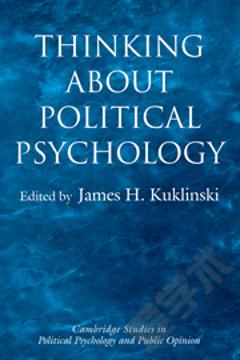Thinking about Political Psychology
Introduction James H. Kuklinski Part I. Defining Political Psychology: 1. The contours of political psychology: situating research on political information processing John L. Sullivan, Wendy M. Rahn and Thomas Rudolph Part II. Theory and Research: 2. Who can persuade whom? Implications from the nexus of psychology and rational choice theory Arthur Lupia 3. Expanding the envelope: citizenship, contextual methodologies, and comparative political psychology Pamela Johnston Conover and Donald D. Searing 4. The challenges of political psychology: lessons to be learned from research on attitude perception Jon A. Krosnick Part III. The Psychology-Political Nexus: 5. Political psychology and political science John L. Sullivan, Wendy M. Rahn and Thomas Rudolph 6. Is political psychology sufficiently psychological? Distinguishing political psychology from psychological political science Jon A. Krosnick 7. Political psychology, political behavior, and politics: questions of aggregation, causal distance, and taste Robert C. Luskin Part IV. Political Psychology and Aggregate Opinion: 8. The micro foundations of mood James A. Stimson 9. From denial to extenuation (and finally beyond): political sophistication and citizen performance Robert C. Luskin 10. Political psychology and the micro-macro gap in politics.
{{comment.content}}








 京公网安备 11010802027623号
京公网安备 11010802027623号